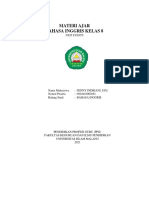Past Simple
Uploaded by
namyPast Simple
Uploaded by
namyNonthaburi Wittayalai School
English Program
LESSON PLAN
Course: EN21102 General English Grade Level: Year 7
Topic: Past simple tense Duration: 150 minutes
Learning Strands
Strand 1: Language for Communication
Standard FL 1.1: Understanding and ability to interpret what has been heard and
read from various types of media, and ability to express opinions with reasons.
Standard FL 1.2: Possessing language communication skills for effective
exchange of information; efficient expression of feelings and opinions
Strand 4: Language and Relationship with Communities
Standard FL 4.1: Ability to use foreign languages in various situations: in school,
community, and society
Objectives
By the end of the lesson, students will be able to:
1. Understand and use the usage and how and when to use past simple.
2. Able to differentiate the verb usage of was/ were and irregular verbs.
3. Use was and were in the conversations and sentences.
Materials
visual aids (conversation strips) Canva/PowerPoint slides
worksheets with specific scenarios mini whiteboards and markers
Procedure
1. Lead-in:
1. Open Class: Understanding Past Actions:
Learners will be able to use the past simple tense to talk about actions or
events that happened and were completed at a specific time in the past. They
will be able to form affirmative, negative, and interrogative sentences, such
as:
Affirmative: "I visited Paris last summer."
Negative: "She didn’t like the movie."
Interrogative: "Did you go to the party?"
2. Correct Verb Usage in Past Context:
Learners will acquire the ability to correctly conjugate regular and irregular
verbs in the past simple tense. They will learn how to use regular verbs with "-
ed" endings (e.g., "worked," "played") and recognize irregular verbs that have
unique past forms (e.g., "went,"
Guided Practice:
Explain that the past simple tense is used to talk about actions that happened in
the past. We use it with regular and irregular verbs.
Regular Verbs: Add -ed to the base verb.
Example:
"play" → "played"
"walk" → "walked"
Irregular Verbs: These do not follow a simple rule.
Example:
"go" → "went"
"eat" → "ate"
Complete the sentences using the correct form of the verb in the past simple
tense:
1. I __________ (visit) my grandmother last weekend.
2. He __________ (watch) a movie yesterday.
3. They __________ (play) basketball after school.
4. She __________ (not/go) to the party last night.
5. We __________ (have) lunch at a restaurant yesterday.
2. Assessment
Hand in worksheets and explain the instructions for better understanding.
Example: "I eat /ate my breakfast a bit late today".
When done let them compare their answers to their classmates.
3. Wrap-up
In summary review the rules and how and when to use the past simple and how
they will use them in real-life situations.
Prepared by:
You might also like
- Teacher'S Guide English 9 Third Quarter Stage 1 Desired Result Program StandardNo ratings yetTeacher'S Guide English 9 Third Quarter Stage 1 Desired Result Program Standard14 pages
- 2021-11-30T19-24-15-01-00-18BKJ-Unit_plan_template SEARCHING MULLTIPLE INTELLIGENCESNo ratings yet2021-11-30T19-24-15-01-00-18BKJ-Unit_plan_template SEARCHING MULLTIPLE INTELLIGENCES4 pages
- Unidad Educativa "Otto Arosemena Gómez": EmailNo ratings yetUnidad Educativa "Otto Arosemena Gómez": Email3 pages
- National Autonomous University of ChotaNo ratings yetNational Autonomous University of Chota11 pages
- National Autonomous University of ChotaNo ratings yetNational Autonomous University of Chota11 pages
- Korkyt Ata Kyzylorda University: How Long, Life Experience. Present Simple & Present ContinuousNo ratings yetKorkyt Ata Kyzylorda University: How Long, Life Experience. Present Simple & Present Continuous2 pages
- The Teaching The Teaching OF OF Listening Listening AND AND Speaking SpeakingNo ratings yetThe Teaching The Teaching OF OF Listening Listening AND AND Speaking Speaking32 pages
- Unit 1 - How Children Learn First and Second LanguageNo ratings yetUnit 1 - How Children Learn First and Second Language28 pages
- Lesson Plan - English Language: Date Class Time Number of Pupils Topic Theme Focus Skill Integrated Skills SubskillsNo ratings yetLesson Plan - English Language: Date Class Time Number of Pupils Topic Theme Focus Skill Integrated Skills Subskills5 pages
- 2-Format Bahan Ajar (Materi Ajar) - PPG 2021 Rev-DikonversiNo ratings yet2-Format Bahan Ajar (Materi Ajar) - PPG 2021 Rev-Dikonversi14 pages
- Common Core Lesson Planner: Grade Level: High School 9-12 Subject: Spanish Non-Natives Teacher: Cecilia SerratoNo ratings yetCommon Core Lesson Planner: Grade Level: High School 9-12 Subject: Spanish Non-Natives Teacher: Cecilia Serrato4 pages
- Asl 752 Week 8 Updated Lesson Plan Unit 11No ratings yetAsl 752 Week 8 Updated Lesson Plan Unit 114 pages
- English: Learner's Activity Sheet Assessment ChecklistNo ratings yetEnglish: Learner's Activity Sheet Assessment Checklist11 pages
- All of the Above: Essays on Teaching English as a Foreign LanguageFrom EverandAll of the Above: Essays on Teaching English as a Foreign LanguageNo ratings yet
- Ppcot-Rpms Master Teacher I-Iv Rating SheetNo ratings yetPpcot-Rpms Master Teacher I-Iv Rating Sheet5 pages
- Assignment in JP Rizal - Including Family Tree64% (25)Assignment in JP Rizal - Including Family Tree2 pages
- The Effect of Word Chain Game On The StuNo ratings yetThe Effect of Word Chain Game On The Stu167 pages
- BEGONTES, MESSY PORTFOLIO BATCH 2023 Episode 1-7No ratings yetBEGONTES, MESSY PORTFOLIO BATCH 2023 Episode 1-734 pages
- Examiners' Report/ Principal Examiner Feedback Summer 2013: International GCSE Turkish (4TU0)No ratings yetExaminers' Report/ Principal Examiner Feedback Summer 2013: International GCSE Turkish (4TU0)6 pages
- Chapter 2 - Developing Mission, Vision, and ValuesNo ratings yetChapter 2 - Developing Mission, Vision, and Values24 pages
- Refusing Neoliberal Logics in Research DesignNo ratings yetRefusing Neoliberal Logics in Research Design14 pages
- Weekly Accomplishment Report On The Monitoring of StudentsNo ratings yetWeekly Accomplishment Report On The Monitoring of Students6 pages
- Pressnote - SGT Material New20231028164917No ratings yetPressnote - SGT Material New2023102816491713 pages
- 30 - Okuma Öğretiminde Karşılıklı Öğretim Yönteminin UygulanmasıNo ratings yet30 - Okuma Öğretiminde Karşılıklı Öğretim Yönteminin Uygulanması11 pages
- g7 Odl WHLP q1 w2 September 27 October 1 2021 1No ratings yetg7 Odl WHLP q1 w2 September 27 October 1 2021 17 pages

























































































